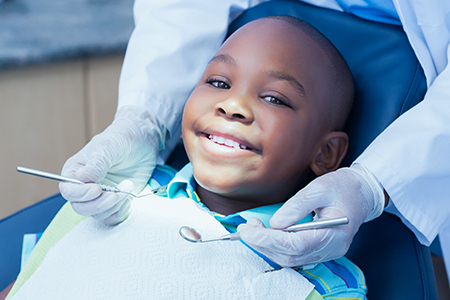
At the office of Richwood Family Dental, supporting healthy growth and confident smiles in children is a distinct focus of our practice. Pediatric dentistry is about more than treating cavities — it’s about establishing lifelong habits, detecting developmental issues early, and helping children feel safe and empowered during dental visits. Our team takes a thoughtful, age-appropriate approach so every visit becomes a building block for long-term oral health.

First dental visits set the tone for how children perceive oral care. We prioritize creating a calm, welcoming environment where children can learn what to expect without fear. Staff members are trained to explain procedures in plain language, use gentle techniques, and move at a pace that matches each child’s comfort level. That approach reduces anxiety and helps kids leave with a sense of accomplishment rather than apprehension.
Establishing a partnership with parents is an essential part of that process. We listen to family concerns, review a child's medical background, and work together to set realistic expectations for behavior and cooperation. This collaboration ensures the child’s visit is productive and aligned with the family’s values and routines.
In addition to behavior guidance, early visits allow us to examine the mouth for signs that could affect future dental development. Early observation and simple interventions can often prevent more involved care later on. By making the first experiences positive, we lay the groundwork for consistent preventive care.

Preventive care is the cornerstone of pediatric dentistry because a proactive plan reduces the chance of pain, infection, and developmental problems. Regular dental exams let us track tooth eruption patterns, evaluate oral hygiene, and apply targeted measures like fluoride treatments and sealants when appropriate. These interventions are simple, safe, and effective at reducing decay in grooves and fissures of newly erupted molars.
Professional cleanings remove plaque and biofilm that are difficult to manage at home, while hygienists provide tailored instruction for brushing and flossing based on age and motor skills. For very young children, we work with caregivers to demonstrate safe techniques and recommend tools that make oral care manageable and effective.
As children transition from primary to permanent teeth, preventive strategies evolve. We monitor bite development and the position of erupting teeth so we can recommend timely referrals or early interventions when necessary. The goal is to protect primary teeth until they’ve fulfilled their role as guides for permanent dentition.
Nutrition and daily routines have a direct impact on a child’s oral health. We counsel families on dietary choices that support strong teeth and gums, emphasizing whole foods, limiting frequent exposure to sugary snacks and drinks, and encouraging water as the primary beverage. Small adjustments in snacking patterns and meal timing can make a measurable difference in cavity risk.
Habits such as prolonged bottle use, frequent nighttime feedings with milk or juice, and extended pacifier or thumb-sucking can influence tooth decay and jaw development. Our team provides practical, developmentally appropriate strategies to address these behaviors so families can work toward healthier patterns without undue stress.
We also pay attention to speech, chewing efficiency, and airway considerations as part of a comprehensive assessment. When nutritional or functional concerns intersect with dental development, early guidance helps support overall growth and well-being.

Active children and teens face a range of dental risks from playground tumbles to sports-related impacts. Custom-fitted mouthguards are an effective, science-based measure to lower the risk of tooth and facial injuries during organized sports and play. We advise families on the right type of mouthguard and provide fitting recommendations tailored to the child’s activity level.
Despite best efforts, accidents can still occur. Understanding what to do in the first minutes after an injury—such as finding and preserving a knocked-out tooth in milk or saliva—can improve outcomes. Our office is prepared to evaluate and treat traumatic injuries, soft tissue wounds, and urgent tooth pain, focusing on timely, evidence-based care to minimize long-term consequences.
Preventive counseling also extends to safety measures beyond sports, such as using appropriate car seats and helmets, and supervising age-appropriate toys. These practical precautions complement clinical care and help lower the chance of emergency visits.
Facial growth and jaw alignment are ongoing processes through childhood and adolescence. Regular dental visits allow us to monitor how the bite evolves, how permanent teeth are emerging, and whether early orthodontic evaluation might benefit the child. Early detection of developmental trends often creates simpler, more effective treatment pathways later on.
When orthodontic or multidisciplinary care is indicated, we discuss the timing and options clearly and objectively so families can make informed decisions. Our role is to assess progress, provide appropriate interim measures, and coordinate with specialists when a team approach will support the best long-term outcome.
As teenagers prepare to transition to adult dental care, we emphasize self-management skills—consistent hygiene, scheduling regular checkups, and understanding how lifestyle choices affect oral health. Equipping adolescents with that knowledge helps ensure continuity of care as they assume more responsibility for their own health.
Parents and caregivers play the central role in a child’s oral health. We provide straightforward guidance on milestones—when to start brushing, how to introduce toothpaste safely, and how to encourage effective home care. Our guidance is practical, age-appropriate, and designed to fit into busy family routines so that healthy habits become sustainable.
We also help families recognize early warning signs that warrant attention, such as persistent mouth pain, swelling, or changes in how a child eats or sleeps. Prompt assessment can prevent small problems from becoming more complex and helps keep children comfortable and healthy.
Open communication is encouraged: our team is available to answer clinical questions, offer preventive tips, and advise on next steps whenever concerns arise. The aim is to make dental care accessible, predictable, and grounded in sound clinical practice.
In summary, pediatric dentistry is a proactive, developmental specialty focused on prevention, education, and the timely management of growth-related concerns. With a patient-centered approach that respects each child’s pace and needs, our goal is to build confident, healthy smiles that last a lifetime. For families in Walton, KY and the surrounding communities, the team at Richwood Family Dental is here to help—please contact us for more information.
A pedodontist is a dentist who has received advanced specialty training in meeting the dental needs of children from infancy to adolescence. Pedodontists, also referred to as "pediatric dentists," study child psychology, behavior management, caring for children with special needs, methods of handling oral/facial trauma, and various techniques for providing anesthesia and sedation. Pedodontists also understand the complexities of facial growth and development and have the clinical skills required to meet the dental needs of all children at every stage of development. Most of all, pedodontists are passionate about what they do and enjoy working with children. They strive to make every dental experience a positive one as they help children establish a strong foundation for good oral health.
Even before your child is born, their first set of teeth is already forming. In fact, by one year of age, some of your baby's front teeth will have already come into place. While the arrival of your baby's first teeth is only one of many developmental milestones, it represents an excellent time to begin a program of oral care. According to recommendations from the American Dental Association, babies should see the dentist around the time of their first birthdays.
Your baby's first teeth typically begin to appear in the 6 to 12-month range. While this is an extraordinary milestone, you need to be aware that your baby may find the experience a little bit uncomfortable. Teething can make babies feel irritable. They may be fussy, have trouble sleeping, not want to eat, and drool quite a bit.
Although you are powerless to speed up the process of teething, there are a few things that you can do to soothe your baby as the new teeth are erupting into place. Common approaches to helping your baby feel more comfortable while getting new teeth, include teething rings or a cold spoon or moist gauze rubbed over their gums.
Even for these few new teeth, it's absolutely essential to establish an effective regimen of oral care. For information on when your baby's first set of teeth will erupt into place, consult this timeline from the American Dental Association: Eruption Charts
Some children persist in sucking their thumbs or fingers beyond their preschool years. For these children, the activity continues to be a source of comfort, relaxation, and security. It may even help them fall asleep at night. However, it's essential to be aware that in the long-term, a finger sucking habit is not healthy.
If your child's thumb or finger sucking habit is still present when the permanent teeth begin to come in, your child is at a higher risk of developing a bad bite. By the age of five or six years, you need to constructively and gently help your child stop the habit.
It's also a good idea to have a comprehensive evaluation at this time. Your pedodontist can assess if there are any habit related alterations to the alignment of your child's teeth or jaws, or if it is affecting their speech or swallowing patterns. They can also discuss habit control strategies with you, as well as follow your child's bite and facial development as they grow. If interceptive appliances or corrective orthodontic care are recommended, the timetable and best options in care will be explained in complete detail.
The American Academy of Pediatric Dentistry and the American Dental Association recommend a child's first dental visit by the time of the first birthday or when the first tooth appears. Early visits allow the dentist to monitor tooth and jaw development, identify risk factors, and introduce preventive habits in a relaxed setting. Establishing this partnership early helps reduce anxiety and sets the stage for positive future experiences.
At Richwood Family Dental in Walton, KY the initial visit typically focuses on a gentle exam, guidance on home care, and time for parents to ask questions. The appointment is brief and intended to be reassuring for both child and caregiver while teaching basic cleaning techniques. Building this early foundation supports long-term oral health and effective preventive care.
For most children, routine dental checkups and professional cleanings every six months are appropriate, but scheduling should be individualized based on each child's risk of decay and overall health. Children with a history of cavities, special needs, or complex medical conditions may require more frequent monitoring. Your child's dentist will recommend an interval that balances prevention and close observation.
Each visit typically includes a clinical exam of the teeth, gums, bite, and jaw, with digital radiographs used when clinically necessary to evaluate underlying issues. A gentle prophylaxis removes plaque and allows hygienists to reinforce brushing and flossing techniques tailored to your child's age. Early detection of developing problems permits more conservative, effective treatment.
Daily brushing with a soft, age-appropriate toothbrush and supervised flossing once teeth contact are the cornerstones of cavity prevention. Limiting sugary drinks, avoiding putting a baby to bed with a bottle of milk or juice, and offering water between meals reduce prolonged acid exposure on developing teeth. Modeling consistent oral hygiene and healthy snacking helps children adopt good habits more readily.
Professional preventive measures such as periodic topical fluoride applications and the placement of dental sealants on newly erupted permanent molars add an extra layer of protection against decay. Regular dental visits allow the team to identify early signs of cavities and intervene before problems progress. Combining thorough home care with in-office prevention significantly lowers the likelihood of restorative treatment.
Teething commonly causes increased drooling, irritability, and a desire to chew; timing varies but signs often begin between six and twelve months. Safe, nonmedicated measures such as firm rubber teething rings, a chilled (not frozen) washcloth, or a cooled spoon can provide relief without risk. Gentle massage of the gums with a clean finger may also soothe discomfort and support eruption.
If your baby develops a high fever, persistent refusal to eat, or symptoms that concern you, contact the dental office or your pediatrician for guidance. The dentist can review safe symptom management and help rule out other causes of fussiness. Keeping emerging teeth and gums clean reduces the chance of irritation or infection as teeth come in.
Thumb and finger sucking as well as pacifier use are natural self-soothing behaviors for infants and young children and are usually not harmful in the earliest years. Concerns arise when these habits persist past the preschool years, as prolonged sucking can influence tooth position and jaw development. Parents should observe the frequency and intensity and begin gentle redirection when appropriate.
If a habit continues past about age 4 or is altering the way the teeth or bite form, seek guidance from your dental provider for constructive strategies. Positive reinforcement, gradual limits, and substitution techniques often help, and the dentist can suggest behavioral approaches or appliances when needed. Early, compassionate intervention reduces the risk of orthodontic consequences later.
Topical fluoride and dental sealants are effective preventive measures that complement daily oral hygiene to reduce the risk of decay. Fluoride strengthens enamel and is applied selectively based on a child's cavity risk, while sealants are a thin protective coating placed on the chewing surfaces of permanent molars to block bacteria and food debris. Both procedures are quick, painless, and well tolerated by children.
The decision to use fluoride treatments or sealants depends on age, risk factors, and the eruption pattern of teeth; your dentist will recommend timing and frequency during routine exams. Sealants are most beneficial soon after permanent molars erupt, and fluoride may be applied periodically to high-risk patients. These preventive steps preserve tooth structure and decrease the likelihood of future restorations.
An orthodontic evaluation is commonly recommended by age 7 to identify early signs of bite or jaw problems that may benefit from monitoring or interceptive treatment. Many alignment and growth issues are easier to address when detected early, potentially simplifying later comprehensive care. Not every child needs immediate orthodontic treatment, but screening allows for timely planning when growth patterns suggest benefit.
Your general dentist will track facial growth, tooth eruption, and jaw relationships during routine exams and refer to an orthodontic specialist if indicated. When early intervention is appropriate, it may reduce the need for more complex treatment later and guide better functional development. Regular assessments ensure interventions occur at the most beneficial stages of development.
If your child sustains a dental injury—such as a knocked-out, loosened, or fractured tooth—or experiences severe tooth pain or uncontrolled bleeding, contact the dental office immediately and seek prompt care. Rapid, appropriate action can be critical, especially if a permanent tooth has been avulsed and reimplantation is possible with timely attention. While arranging care, preserve a knocked-out permanent tooth in milk or saliva and avoid touching the root.
At Richwood Family Dental the team provides guidance on immediate steps to reduce damage and discomfort and prioritizes urgent pediatric needs. For injuries involving facial trauma, heavy bleeding, or loss of consciousness, seek emergency medical attention in addition to contacting the dental office. Follow-up appointments will assess healing, address infection risk, and plan any required restorative or developmental care.
Preparing a child for dental visits with simple, positive explanations and age-appropriate role play helps reduce fear and build familiarity. Use straightforward language, emphasize the helpful aspects of the visit, and avoid using the dentist as a threat or punishment. Reading books about dental visits, practicing with a toothbrush at home, and scheduling at a calm time of day can make appointments feel more predictable and less intimidating.
For children with significant anxiety, sensory sensitivities, or special medical needs, discuss strategies with your dentist such as desensitization visits, quiet rooms, or stepwise introductions to procedures. The dental team can employ behavioral techniques and create a predictable routine to increase comfort during care. In select cases a professional discussion about sedation options may be appropriate and will be handled with careful assessment and clear communication.
A properly fitted mouthguard is one of the most effective ways to protect a child's teeth, lips, and jaw during sports and recreational activities. Custom mouthguards fabricated by a dental professional offer superior fit, retention, and comfort compared with generic over-the-counter options, which improves the likelihood that they will be worn consistently. Coaches and parents should encourage use of mouthguards for contact and collision sports.
Beyond mouthguards, appropriate helmets, face protection, and safe playing techniques reduce the risk of dental and facial injuries. If a dental injury does occur, seek prompt evaluation to check for fractures, displacement, or soft tissue damage and to plan any necessary treatment. Follow-up care helps ensure proper healing and reduces the chance of long-term consequences to dental development.
Quick Links
Contact Us